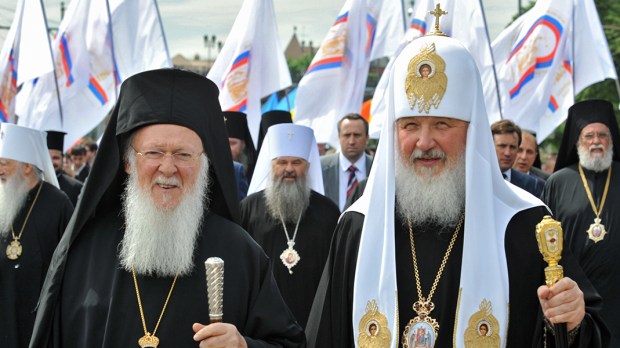A long-simmering dispute between two of the world’s leading Orthodox Churches got ratcheted up this week when the Ecumenical Patriarch, considered “first among equals” among the leaders of Orthodoxy, renewed a decision to grant Ukrainian Orthodox faithful ecclesiastical independence from the Russian Orthodox Church.
Ukrainian Christians, who trace their spiritual heritage to Constantinople in the Eastern Roman Empire, have lobbied for a century for “autocephaly,” the right to govern themselves while remaining in full communion with the other Orthodox Churches of the world. Autocephaly is an administrative issue that does not disrupt the unity of belief and liturgical practices, the valid administration of the Sacraments, and the apostolic succession of bishops.
Both Ukraine and Russia trace their spiritual roots to the city of Kyiv, or Kiev. Before the Great Schism between Rome and the Eastern Orthodox, Prince Volodymyr, or Vladimir, of Kyivan Rus, accepted Christianity from the seat of the Archbishop of Constantinople and had his pagan nation baptized. That event, in 988, was the beginning of Christianity in the Slavic East.
In the Middle Ages, because Kyiv was under siege from the Mongols, Church leaders there moved to the city of Vladimir and eventually to Moscow. Around the time of the fall of Constantinople in 1453, a Russian Orthodox Church was emerging, and Kyiv came under the Grand Duchy of Lithuania and later the Polish–Lithuanian Commonwealth. The Kyivan Church continued under the jurisdiction of the Ecumenical Patriarchate of Constantinople until 1686, when it was transferred to the jurisdiction of Moscow.
After a couple of failed attempts for autocephaly in Ukraine in the 1920s and 1940s, the issue was revived in the midst of Ukrainian independence in 1991, following the breakup of the Soviet Union, of which Ukraine was a part. The Ukrainian Orthodox Church of the Moscow Patriarchate, which is recognized by the other Orthodox Churches of the world, found itself in competition for believers with a couple of breakaway groups: the Ukrainian Orthodox Church of the Kyiv Patriarchate and the Ukrainian Autocephalous Orthodox Church. Neither was ever recognized by global Orthodoxy as “canonical” and were considered schismatic.
The issue languished until a renewed Russian aggression—in the form of the annexation of the Ukrainian peninsula of Crimea in 2014 and a Russia-backed separatist movement in Eastern Ukraine—generated a backlash among nationalistic Ukrainians. Earlier this year, Ukrainian President Petro Poroshenko, backed by the Ukrainian parliament, presented a formal request for autocephaly to Ecumenical Patriarch Bartholomew I in Istanbul.
On April 20, Bartholomew, along with the Synod of the Ecumenical Patriarchate, decided to grant autocephaly. Bartholomew dispatched two bishops to Ukraine to pave the way for eventual granting of a “tomos,” a formal declaration that the Ukrainian Orthodox Church was independent. The two bishop-legates returned recently to Istanbul, and after discussion, the Patriarch and the Synod on Thursday issued a declaration to “renew the decision already made that the Ecumenical Patriarchate proceed to the granting of Autocephaly to the Church of Ukraine.”
The decree issued on Thursday also acknowledged that the leaders of the breakaway Ukrainian Orthodox Churches were in schism “not for dogmatic reasons.” The Patriarch reinstated those leaders “to their hierarchical or priestly rank, and their faithful have been restored to communion with the Church.”
Bartholomew and his Synod also revoked the decision of 1686, that transferred Kyiv from the Patriarchate of Constantinople to the Patriarchate of Moscow, saying it was a decision done “for the circumstances of that time.”
Finally, the declaration appealed to “all sides involved that they avoid appropriation of churches, monasteries and other properties, as well as every other act of violence and retaliation, so that the peace and love of Christ may prevail.”
The Russian Orthodox Church, which all along has challenged Constantinople’s right to grant autocephaly unilaterally, slammed Thursday’s announcement as an “unprecedented anti-canonical act” that attempts to “destroy the very foundations of the canonical structure of the Orthodox Church.”
“It is hard to assess otherwise the announcement by Constantinople’s Synod to enter into canonical communion with schismatics and a man excommunicated from the Church,” said Russian Orthodox Church spokesman Vladimir Legoyda, referring to the Ukrainian Orthodox Church Church-Kyiv Patriarchate’s leader Filaret Denysenko.
“These actions will be given a proper competent assessment at the next meeting of the Russian Orthodox Church’s Holy Synod on October 15,” Legoyda said.
Earlier, Russian Orthodox Patriarch Kirill of Moscow was quoted as saying that his Church will “have to break eucharistical relations with Constantinople” if plans for autocephaly goes forward.

